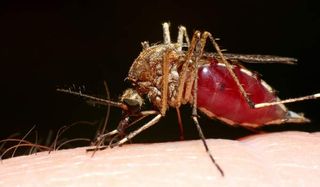Mosquitoes Pick Out Human Meals With Help from Microbes

Mosquitoes like some people better than others, and differences in the microbes living on our skin may help explain the bloodsuckers' dining preferences.
It turns out men with a large variety of microbes living on their skin make for less attractive meals for the African malaria-carrying mosquito Anopheles gambiae sensu stricto.The mosquito instead appears drawn to men whose skin bacteria are relatively similar to each other. [Gallery: Bacteria in Your Bellybutton]
Those findings come from a study that also found a connection between certain types of microbes and men's status as more or less attractive to a mosquito.
Preventing disease
Mosquito bites are more than just an itchy annoyance; they can spread malaria and other fatal diseases. Malaria is caused by a parasite called Plasmodium, and in 2010 it was responsible for an estimated 655,000 deaths, mostly among African children, according to the World Health Organization. [Top 10 Deadliest Animals ]
So the relationship between mosquitoes' preference and skin microbes has important health implications.
This study suggests skin microbes could be part of a person's built-in defense system, and this line of research could lead to new tools to protect against the spread of disease, the research team writes in a study published Dec. 28 in the journal PLoS ONE.
Sign up for the Live Science daily newsletter now
Get the world’s most fascinating discoveries delivered straight to your inbox.
The secret's in the sweat
The logic behind the effect is simple: Odors from human skin are essential cues that guide mosquitoes to our skin, and the microbes living on our skin play an important role in producing these odors. In fact, without skin bacteria, human sweat would be odorless to the human nose, according to the researchers, led by Niels Verhulst of Wageningen University in the Netherlands. [Bugs Love the Way You Sweat]
Verhulst and colleagues collected volatiles — the easily evaporated chemicals responsible for odor — from the left feet of 48 men. They then gave the mosquitoes a choice between each sample and a standard ammonia concentration. (The odor of ammonia is known to attract mosquitos.) They also sequenced DNA from the skin of the left foot; this gave them information on what, and how much of it, was living on the men's feet.
Of the 48 men who volunteered for the study, the researchers classifed nine as "highly attractive", while seven were considered "poorly attractive."
The microbes responsible
In addition to finding that a greater diversity of skin microbes seems to deter mosquitoes, the researchers came to associate certain types of bacteria with how delicious the mosquitoes found the person to be.
The more tasty men had microbes that were less diverse and were likely to include Leptotrichia, Delftia, Actinobacteria Gp3, and Staphylococcus microbes, the researchers found.
Meanwhile, the volunteers who, for instance, had a diverse array of microbes on their skin, as well as lots of Pseudomonas and possibly Variovorax species, were less attractive.
"We hypothesize that the lower attractiveness to mosquitoes is caused by a selective group of skin microbiota that emanates compounds that interfere with the attraction of mosquitoes to their human hosts," the researchers wrote.
You can follow LiveScience senior writer Wynne Parry on Twitter @Wynne_Parry. Follow LiveScience for the latest in science news and discoveries on Twitter @livescience and on Facebook.
Most Popular


